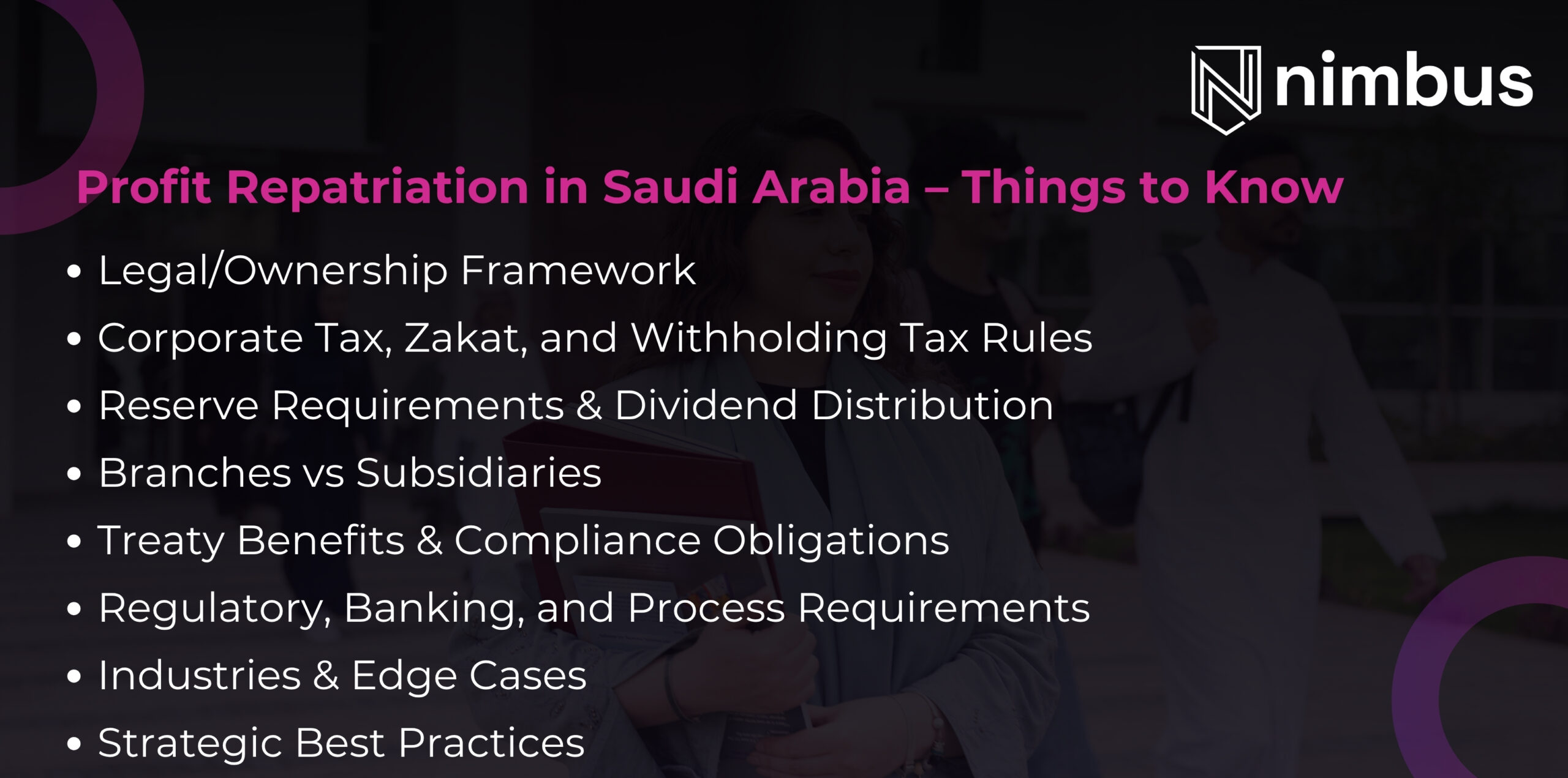Entering the Saudi market as a foreign company means more than launching operations. If you plan to send profits back to your parent company, you’ll need to understand how profit repatriation works under Saudi law.
The choices you make around ownership, entity type, and compliance will affect taxes, timing, and what you’re legally allowed to distribute overseas.
Below are the key rules and factors to guide smooth profit repatriation from Saudi Arabia, along with strategic advice for companies preparing to remap ownership or for business setup in Saudi Arabia.
Profit Repatriation in Saudi Arabia – Things to Know

1. Legal/Ownership Framework
– Saudi Arabia’s Foreign Investment Law allows foreign investors to repatriate profits, liquidation proceeds, or equity sale proceeds from wholly foreign-owned companies and joint ventures under lawful projects. Regulatory approval from the Ministry of Investment (MISA) is required for investment licensing.
– Wholly foreign-owned subsidiaries have full control over dividend distribution if statutory reserve requirements are met and requisite board approvals are in place.
– Joint ventures with Saudi or GCC partners are more complex: profit allocation, Zakat, and corporate tax obligations differ depending on foreign/local ownership levels.
2. Corporate Tax, Zakat, and Withholding Tax Rules
– Foreign entities pay corporate income tax at a rate of 20% on net adjusted profits. Local or Saudi/GCC-owned entities generally pay Zakat (2.5%) instead. Mixed ownership structures face proportional taxes.
– Withholding tax (WHT) applies when profits, fees, royalties, or services are paid to non-resident shareholders or service providers:
• Dividends to foreign shareholders: 5%
• Management fees: 20%
• Royalties and technical service fees: 15%
– Double tax treaties (DTTs) may reduce these rates or exempt them if conditions (such as beneficial ownership) are met. Treaties with many jurisdictions allow relief if proper documentation is submitted.
3. Reserve Requirements & Dividend Distribution
– Saudi Companies Law mandates companies allocate 10% of annual net profits to a statutory reserve until that reserve reaches 30% of the paid-up capital. This applies for LLCs and JSCs.
– Boards may also set aside contractual (or special) reserves for future stability or dividend equalization. These may limit how much profit is immediately distributable.
– Dividend declarations must be approved by the general assembly, and distribution must occur within 15 business days after approval. Audited financial statements are required to validate profits.
4. Branches vs Subsidiaries
– Branches of foreign companies can send profits abroad without formal “dividend” declarations, as long as the funds represent legitimate post-tax earnings. However, the same audit, documentation, and compliance burdens apply.
– Subsidiaries, whether wholly foreign or mixed, must follow corporate entity rules, reserve requirements, board and financial audits, and dividend approvals.
5. Treaty Benefits & Compliance Obligations
– To claim reduced withholding under a DTT, foreign shareholders or companies must provide proof of beneficial ownership and comply with formal treaty application procedures via ZATCA’s electronic portal. Claims are often valid for up to five years from payment date.
– Transfer pricing rules now apply if related-party transactions exceed thresholds. Companies must maintain Master and Local Files per OECD BEPS standards and submit controlled transaction disclosures. Failure to do so can lead to reassessments, penalties, or delays in profit repatriation.
6. Regulatory, Banking, and Process Requirements
– Saudi banks and the Zakat, Tax and Customs Authority (ZATCA) will typically require: audited financial statements, board resolutions approving dividend or profit repatriation, tax clearance certificates, proof of post-tax net profits, compliance with reserve laws.
– Audited statements generally must be submitted within 120 days of fiscal year-end. Delays can incur fines and risk repatriation being delayed.
– The process of repatriation must align with both Saudi corporate filings and any foreign tax years of the parent company for smooth cross-border movement.
7. Industries & Edge Cases
– Certain sectors, especially oil and hydrocarbon, face much higher effective tax rates (50-85%) depending on project scale. Natural gas investments tend to have special rates like ~30%. Because of that, structuring a holding entity or joint venture in these industries requires expert advice.
– Special economic zones may offer modified or preferential rules under Saudi law, including potentially modified withholding or repatriation provisions (depending on licensing regime).
8. Strategic Best Practices
– Schedule profit distributions to coincide with your fiscal closing and meeting deadlines to reduce delays.
– Maintain clean books, with audit trails, compliant reserve allocations, and solid documentation.
– Use treaties wisely: ensure beneficial ownership, avoid “shell company” arrangements, satisfy substance tests.
– Plan ahead: businesses should gauge tax obligations, Zakat, withholding etc., when choosing ownership structure (wholly foreign vs JV).
– Work with local tax and legal advisors to keep up with regulatory changes, especially if you’re going for company formation in the KSA.
Profit repatriation in Saudi Arabia is feasible and increasingly flexible, especially under newer foreign investment reforms. But it is not automatic or without carefully placed legal, tax, and operational compliance steps.
Ownership structure, entity type, statutory reserves, withholding tax, and treaty application all matter. For foreign companies preparing business setup in Saudi Arabia, early planning with expert advisors is essential, so that profits travel seamlessly back home, risks are managed, and your investment realizes its fullest return.



